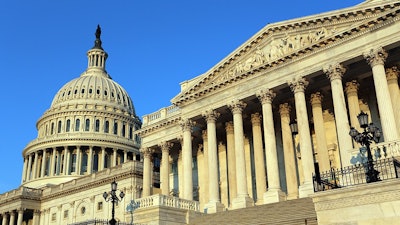
The Secure and Fair Enforcement (SAFE) Banking Act’s chances of clearing the U.S. Senate are again fading as Senate Minority Leader Mitch McConnell urges congressional leaders to remove the cannabis-related language from the National Defense Authorization Act (NDAA).
The Kentucky Republican called on Senate Majority Leader Chuck Schumer, D-N.Y., and House Speaker Nancy Pelosi, D-Calif., to forego the SAFE Banking provisions, which would allow federally regulated financial institutions to work with state-legal cannabis businesses.
McConnell dismissed the banking-related language Dec. 6 as reform “in name only,” according to The Hill.
“House and Senate Democrats are still obstructing efforts to close out the NDAA by trying to jam in unrelated items with no relationship whatsoever to defense,” McConnell said on the Senate floor Tuesday, according to the news outlet. “We’re talking about a grab bag of miscellaneous pet priorities, like making our financial system more sympathetic to illegal drugs or permitting reform in name only that’s already failed to pass the Senate earlier this year.”
McConnell suggested that Democrats could have brought the SAFE Banking Act to the Senate floor earlier this year, The Hill reported, and said stripping its provisions from the NDAA will give the defense bill a better chance of passing Congress before the end of the year.
“My colleagues across the aisle need to cut their unrelated hostage-taking and put a bipartisan NDAA on the floor,” he said.
When the NDAA bill text was released later on Tuesday, it did not include any provisions related to federal cannabis policy reform.
The news comes as House Democrats have their majority leadership days numbered following November’s election, when Republicans gained nine seats (with one race still pending) to retake control of the chamber in 2023.
Under Democratic control for the past four years, the House has passed the SAFE Banking Act seven times, including twice as standalone bills.
Last Congress, the House overwhelmingly passed the measure with a 321-103 vote in 2019 and then two more times as part of federal coronavirus relief bills in 2020. But the legislation stalled, in part because McConnell never acted on calendaring it for floor debate in the upper chamber.
In 2021, SAFE Banking cruised to passage by a 321-101 vote as a standalone measure in April and then passed again via a voice vote in September as an attachment to the NDAA spending package for fiscal 2022. The act was removed from the NDAA during negotiations between House and Senate leaders.
And in 2022, House members approved SAFE Banking a sixth time via an en bloc amendment package to the America COMPETES Act in February and a seventh time by, again, attaching it to the NDAA as an amendment in July.
Today marks the *7th time* the #SAFEBankingAct has passed the U.S. House.
— Rep. Ed Perlmutter (@RepPerlmutter) July 14, 2022
I’m calling on the Senate to take action for the safety of our communities and success of Veteran- and minority-owned businesses across the country.
It’s time to get this done. #SAFEBanking
"While it’s disappointing the Senate failed to include cannabis banking and restorative justice reforms in the NDAA, we are confident that the majority of Senators are committed to enacting a bipartisan version of SAFE Plus by the end of this year,” Khadijah Tribble, CEO of the U.S. Cannabis Council (USCC), said in a public statement. “Thus, we remain optimistic that we’ll see cannabis reforms appear in another legislative vehicle in the coming weeks. USCC will continue fighting for federal cannabis banking laws that reflect the reality on the ground and will make our industry more competitive, diverse, and secure for the communities we operate in.”
But even with Schumer calling the shots on the floor of the upper chamber since the beginning of 2021, the latter four House passages have yet to make any sort of meaningful headway under his watch.
However, Schumer said during a campaign debate in October that lawmakers “are getting very close to a deal” on cannabis banking reform, The Hill reported. Schumer added that the legislation would also include expungement provisions for nonviolent cannabis-related offenses.
“I am working in a bipartisan way with Democrats and Republicans to take the SAFE Banking Act, which allows financial institutions to involve themselves in cannabis companies and lend money to them—but it also does things for justice, such as expunging a record,” Schumer said at the debate.
Meanwhile, Schumer, Senate Finance Committee Chairman Ron Wyden, D-Ore., and Sen. Cory Booker, D-N.J., filed the Cannabis Administration and Opportunity Act (CAOA) in July, expanding upon a draft that the Senate trio initially unveiled in July 2021.
RELATED: Industry Advocates, Stakeholders Appraise Schumer’s Cannabis Bill
The 296-page bill would remove cannabis from the Controlled Substances Act, tax and regulate cannabis at the federal level, and grant states the authority to keep or administer their own oversight programs.


























